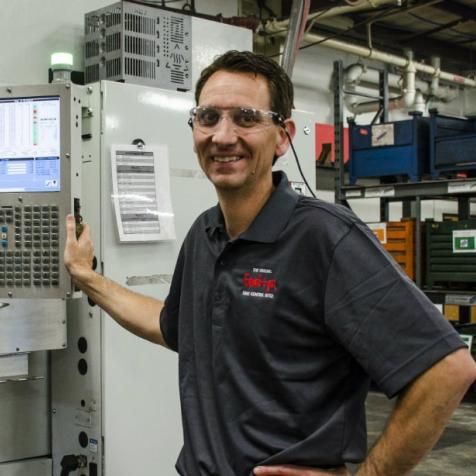
Company Details
Location
Provo, Utah
Founded
1945
Ownership Type
Private
Employees
69
Products
Trailer components and equipment
Established: 1945
Employees: 69
Privately Owned
Provo, Utah
CEO Jed Anderson and Progress Manufacturing remain hitched to consumers in a changing economy
When a family in the 1940s needed to haul a trailer, they simply hitched it to the family car. At times, the result was comical, as Lucille Ball and Desi Arnaz aptly demonstrated in the movie ‘The Long, Long Trailer.’
But founder Ed Hedgepeth realized that many hitches manufactured in the 1940s were unsafe and simply didn’t work very well.
So Hedgepeth moved on from his trailer dealership and began manufacturing products for other trailer dealerships.
“The business took off,” says current CEO, Jed Anderson.

Nearly seven decades later, Progress Manufacturing is still manufacturing towing products. “Our products offer unique advantages by making towing faster and easier and keeping people safer on the road. Our Equal-i-zer hitch offers both 4-point sway control and superior weight distribution, it’s the safest and highest-quality hitch on the market. Our Flash aluminum ball mounts provide superior strength and durability with the best polish and shine on the market.”
Over 65 percent of all Progress Manufacturing products are designed, engineered and manufactured in Provo, Utah. However, they do utilize off-shore services for some general items, particularly those designs less legally protected. Design theft is a concern to Anderson. “Competitors will pop-up, steal a design and offer a cheaper, poorly-made product. And the consumer has no idea. It looks the same. It’s in a pretty box. But the quality is not the same.”

Progress Manufacturing’s products are available in the United States, Canada and Australia. While the need for a quality hitch is constant, the industry is changing due to outside forces. The company’s worked with the same distributors for over 20 years. “We are seeing a lot of consolidation and rolling up of smaller distributors. The channel we use to get our product to the consumer is in major turmoil right now. So we’re keeping the consumer as our focus. If the consumer is ever unhappy, we will change how we do things. We will adjust how we reach the market,” Anderson says.
A lot has changed in the manufacturing industry since the company started 70 years ago. Progress Manufacturing remains flexible and continues to adjust. “We’re so much more automated,” Anderson says. “Our industry needs people who understand math and science. We need engineers with more than book learning. We need engineers who can solve a problem.”

Anderson believes it’s important to introduce high schoolers to the manufacturing business, but regulations limit how they can expose students to machinery. “We want to provide an environment where we can let students try things, learn things and get set up for success in manufacturing,” says Anderson.
Challenge: Government regulations. “Even the school systems are set up to make it degrading to go into manufacturing,” Anderson says. “And manufacturing jobs are going off-shore, where other countries are pumping out products and getting better at it. Manufacturers can feel suffocated by our own government and the way it wants to control business. We want to take care of our employees. We want to be safe. Not just because the government tells us to. Because it’s the right thing to do.”
Opportunities: Putting together a team to provide better products at a better price. “We have a whole team, working together. We are staying competitive. And that’s a win for everybody,” Anderson says.
Need: Talent with work experience. According to Anderson, fifteen years ago local colleges in Utah cut back on technical courses. Trade schools began selling off their equipment and offering fewer courses, leaving Progress with an unskilled pool of potential employees. “Young people come out of school with high debt but no skills,” Anderson says. “We want to encourage and promote manufacturing jobs and change the current perception that manufacturing jobs are second class. Manufacturing can provide fulfilling jobs.”

